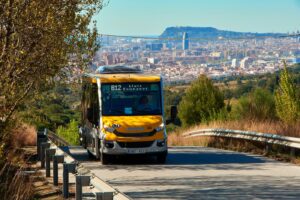
The first anti-tumour membrane in the world successfully implanted in a patient
November 12, 2020
Co-Aps: to manage passenger density on public transport during the pandemic
December 3, 202026/11/2020
The research group Laboratory of Social Studies of Civil Engineering (LESEC) is working on the DIGNITY (Digital Transport in and for Society) project, whose aim is to promote a digital system with inclusive access for all urban mobility.
DIGNITY aims to promote a digital mobility ecosystem that is sustainable, integrated and easy to use and improves accessibility, social inclusion, the travel experience and daily life of all people. In this system, the capacities of all are recognised, regardless of age, income, social status, ability or disability.

DIGNITY will study the challenges that are associated with digitalisation of mobility for users who are potentially vulnerable (elderly people, people with low incomes, people with disabilities and immigrants) so that they are not excluded. The factors that lead to a digital gap between the most vulnerable groups of society will be analysed and strategies and solutions designed to ensure the right to sustainable, safe digital mobility for all citizens in Europe.
In the project, the digital transition in mobility will be analysed from the perspective of the user, supplier, mobility operators and public administrations. The groups will design, test and validate the resulting proposals, to connect user needs and requirements with the provision of mobility services and, at the same time, connect these services with the institutional framework using inclusive design methodologies to jointly create mobility solutions for users and demonstrate the approach in four pilot regions of Europe (Barcelona, Flanders, Tilburg and Ancona). In this project, collaborators include municipalities, universities and industry (transport operators and mobility suppliers) from six European countries.
DIGNITY will last three years (January 2020 – December 2022) and has received funding of over 2 million euros from the European Commission’s Horizon 2020 programme. It has fourteen partners, including universities, research centres, public administration and companies from Catalonia, Germany, Belgium, Holland, Italy and the United Kingdom, all of which are associated with the mobility sector.
Technology
Sector
You want to know more?
Related Projects
- The Barcelona Innovative Transportation (BIT), the Research Center in Automotive and Advanced Mobility (CER-AMA) and The Future Mobility Research Hub (CARNET) research groups from the Universitat Politècnica de Catalunya - BarcelonaTech (UPC) are participating in the E-MED project, which aims to optimise energy and resource efficiency in public transport systems by addressing energy price fluctuations through smart and participatory solutions across the Mediterranean region.
- A research team involving the Barcelona Innovative Transportation (BIT), inLab FIB, CARNET Barcelona – Future Mobility Research Hub (CER-AMA), and the Department of Computer Architecture (DAC) of the Universitat Politècnica de Catalunya - BarcelonaTech (UPC) is driving the i-MovE project, which aims to incorporate multisectoral data to provide much more accurate and valuable information for the mobility sector. The project develops four use cases focused on both companies and mobility authorities, covering public and individual transport, using the UPCxels demonstrator.
- The Research Center for Supervision, Safety and Automatic Control (CS2AC-UPC) at the Universitat Politècnica de Catalunya - BarcelonaTech (UPC) has coordinated the SaCoAV project, focused on researching new methods and tools to ensure the safe coordination of autonomous vehicles in urban environments.
- As part of the USEFUL project, the Centre for Sensor, Instrumentation and Systems Development (CD6) at the Universitat Politècnica de Catalunya - BarcelonaTech (UPC) has equipped a low-emission vehicle that will drive through the streets of Terrassa with optical sensors integrated into a complex system for data computing, visualisation, and storage. This car will collect and store thousands of anonymous driving data points, which will be used to develop more accurate algorithms for autonomous driving.




